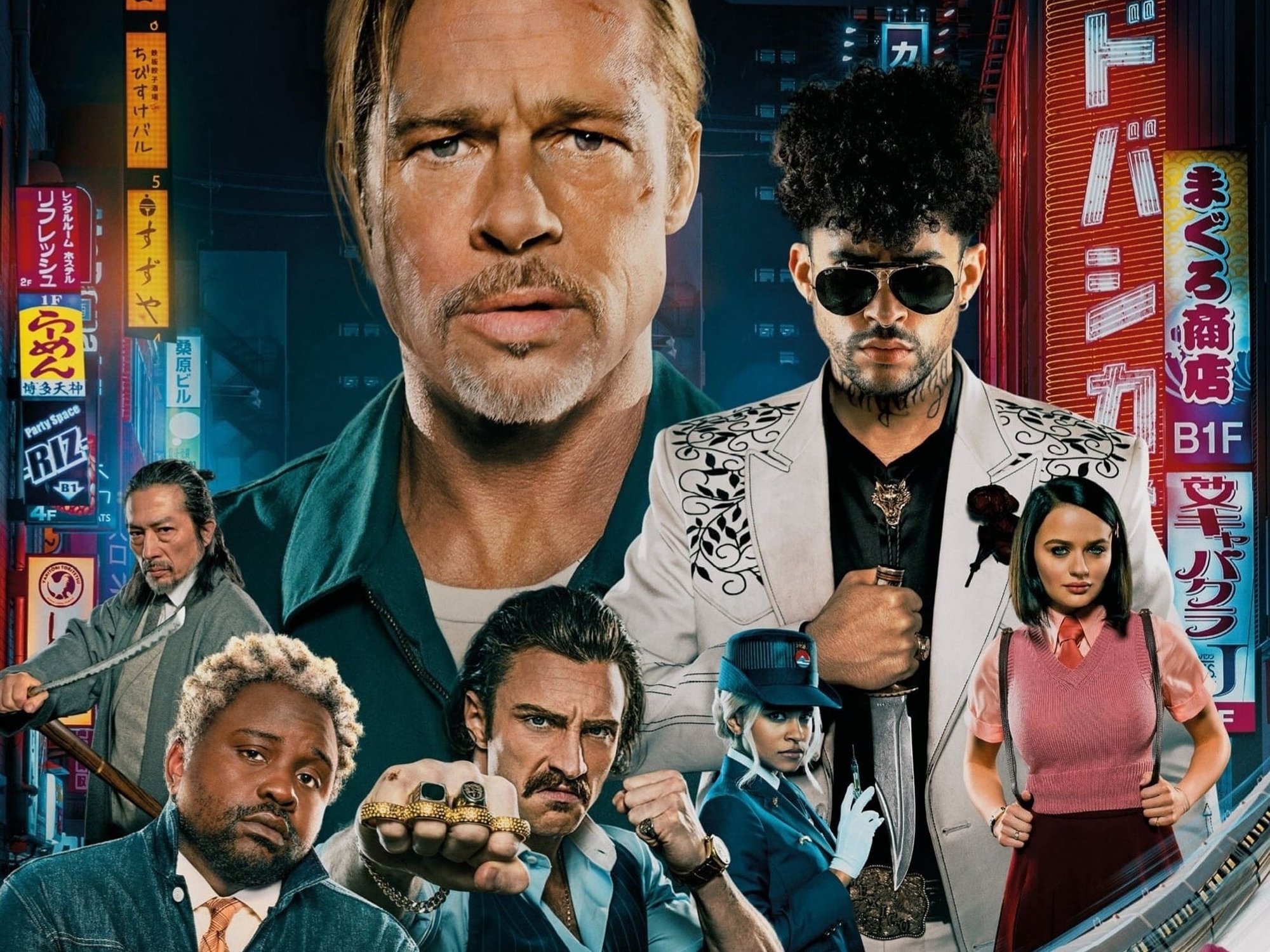Film Review: Bullet Train
David Leitch’s action-packed Bullet Train is excruciatingly unfunny and hollow
Action maestro David Leitch (John Wick, Deadpool, Atomic Blonde) returns with Bullet Train, a mile-a-minute, star-studded bloodbath. It’s a bombastic actioner that coasts by on kinetic fisticuffs and spectacular carnage, but not even Brad Pitt’s charisma nor Leitch’s eye for brutal violence can save it from its hollow Tarantino pastiche and its excruciatingly unfunny attempts at cleverness. Minor spoilers ahead…
David Leitch - the gunplay-minded force behind films such as John Wick, Deadpool, and Atomic Blonde - directs Brad Pitt in a star-studded assassination tango aboard a hyper-speed commuter train. If that sounds great to you, it’s because Bullet Train has all the right ingredients for the perfect summer actioner: a charismatic superstar lead, bloody balletic mayhem, and a slow-assembling puzzle box adapted from a breezy Japanese page-turner. It seems that everything is in place for heat-seeking delivery of exactly what’s advertised on the tin. So why, then, does Bullet Train fall so short of its promise? As with other Leitch-helmed brawlers, the meat is in the action, but it’s everything in between the bare-knuckle brawls and flesh-ripping bullets that feels so hollow: From its Tarantino pastiche that’s much less clever than it thinks it is - and much more convoluted than it has any right to be - to its interminably droning attempts at comedy, Bullet Train feels more like a chore with every stop it makes.
Brad Pitt - fighting tooth and nail to keep a painfully unfunny script afloat with his movie star charisma - stars as “Ladybug,” an operative tasked with retrieving a suitcase full of cash aboard a barreling train en route from Tokyo to Kyoto. Picking the most inopportune time to employ a brand-new zen attitude that lends more to “snatch and grabs” than straight up assassinations, “Ladybug” soon finds himself embroiled in a messy hitman free-for-all as a whole slew of unsavory characters board the train to kill one other. Those among the colorful rogues gallery? Bickering British brothers Tangerine (Aaron Taylor-Johnson) and Lemon (Brian Tyree Henry), a precocious mastermind disguised as a schoolgirl (Joey King), a serial poisoner (Zazie Beetz), and a vengeance seeking assassin (Andrew Koji). And swirling in the epicenter of this high-speed clusterfuck is the mysterious “White Death,” a fearsome Yakuza usurper who’s become the boogeyman of the Japanese underworld, his sinister tendrils connecting every assassin aboard the titular locomotive. “You put peace into the world and you get peace back,” Pitt tells himself, but his newfound disposition is not nearly enough to defuse the situation when the suitcase becomes a hot potato and the bodies start piling up.
“As with other Leitch-helmed brawlers, the meat is in the action, but it’s everything in between the bare-knuckle brawls and flesh-ripping bullets that feels so hollow…”
To get the obvious out of the way first, Leitch clearly knows his way around an action scene. Even with its frenzied pacing, Bullet Train’s expertly choreographed melees remain several cuts above standard Hollywood fare. Claustrophobic close quarters lend to brutal, impactful blows, and Elisabet Ronaldsdottir’s editing harkens back to the conciseness of Hong Kong’s action heyday as shell casings fly, throats are gashed, and skulls are crunched. As the set pieces grow in size, they start to lose much of their staccato flair to garish CGI and green screen muddle, but Bullet Train’s action - for the most part - doesn’t disappoint. Its flimsy connective tissue, however, is a whole other story.
Bullet Train is illusory vapor, a hallucination of a good time that dissipates into empty calories. Characters talk fast but say very little, a needlessly twisted timeline that apes the stylings of Quentin Tarantino and Guy Ritchie amounts to nothing at all, and every unfunny bit is just about 30 seconds too long. Silly costumes, bad accents, and smash-cut flashbacks paint a veneer of depth for the story’s ever-expanding roster of characters, but it simply isn’t enough to hide the fact that Bullet Train is trying way too hard to be cool. Even the jokes extrapolated from its source material - Kotaro Isaka’s crowd-pleasing Maria Beetle - is hacked to death by the film’s Hollywood treatment: You’ll never see a joke driven deeper into the ground than Bullet Train’s indefensibly unfunny, never-ending Thomas the Tank Engine bit. Even Brad Pitt’s initially endearing “aw shucks” routine grows tiresome by the movie’s end.
“Bullet Train is illusory vapor, a hallucination of a good time that dissipates into empty calories.”
To its credit, however, the marquee cast all seem to be having a blast, with every larger-than-life caricature rising way above the words written on the page. Logan Lerman, Zazie Beetz, and Bad Bunny are pretty much glorified cameos, but their committed performances draw the funniest thread of the movie that combines an escaped snake, projectile fountains of blood, and a Weekend at Bernie’s charade. On the other end of the scale, Andrew Koji and Hiroyuki Sanada inject some much needed dignity into Bullet Train’s highly unserious spectacle, but their presence - the only Japanese actors billed in an adaptation of a Japanese novel taking place in Japan - only highlights how glib, cavalier, and overly slick the whole production is.
By Bullet Train’s preposterous third act, it all pretty much falls apart: Its carefully built house of cards collapses in the most underwhelming of ways. Zak Olkewicz’s labyrinthine script feigns a buildup to a big reveal - a grand prestige, if you will - but it’s all a risible smokescreen: Once the carnage fades with a groan-worthy cameo and you figure out how everyone is connected, you’ll wonder if this train was ever worth climbing aboard in the first place. At one point, Lemon laments the state of entertainment today. “Twists, violence, drama - no message,” he decries. You can hang a lampshade on the movie you’re in, but sadly, that doesn’t make it any less true.













